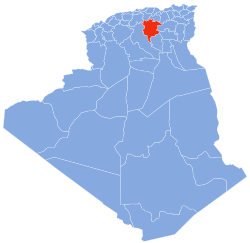M'sila_Province
M'Sila Province
Province of Algeria
M'Sila (Berber languages: ⵎⵙⵉⵍⴰ Msila) is a province (wilaya) of northern Algeria. It has a population of 1 million people and an area of 18,718 km², while its capital, also called M'Sila, home to M'Sila University, has a population of about 100,000.
This article needs additional citations for verification. (October 2021) |
Localities include Bou Saada and Maadid. Chott El Hodna, a salt lake, crosses into M'Sila. However, most of the region is semi-arid and undeveloped.
Additionally, M'Sila was the location of the first village constructed as part of a government-run program to transition nomadic Algerians to sedentary life using local materials.
The village, now complete, was dubbed Maader and consists of houses, public and trading areas, and a mosque.
